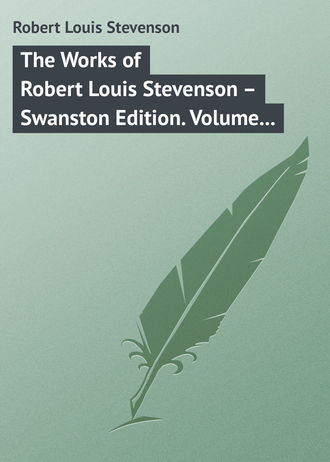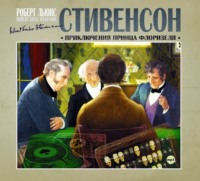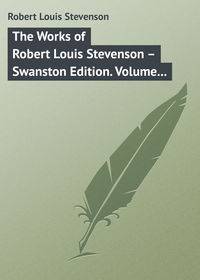 полная версия
полная версияThe Works of Robert Louis Stevenson – Swanston Edition. Volume 16
But in the Reader we are still under guides. What a boy turns out for himself, as he rummages the bookshelves, is the real test and pleasure. My father’s library was a spot of some austerity: the proceedings of learned societies, some Latin divinity, cyclopædias, physical science, and, above all, optics, held the chief place upon the shelves, and it was only in holes and corners that anything really legible existed as by accident. The “Parent’s Assistant,” “Rob Roy,” “Waverley,” and “Guy Mannering,” the “Voyages of Captain Woods Rogers,” Fuller’s and Bunyan’s “Holy Wars,” “The Reflections of Robinson Crusoe,” “The Female Bluebeard,” G. Sand’s “Mare au Diable” – (how came it in that grave assembly!), Ainsworth’s “Tower of London,” and four old volumes of Punch– these were the chief exceptions. In these latter, which made for years the chief of my diet, I very early fell in love (almost as soon as I could spell) with the Snob Papers. I knew them almost by heart, particularly the visit to the Pontos; and I remember my surprise when I found, long afterwards, that they were famous, and signed with a famous name; to me, as I read and admired them, they were the works of Mr. Punch. Time and again I tried to read “Rob Roy,” with whom of course I was acquainted from the “Tales of a Grandfather”; time and again the early part, with Rashleigh and (think of it!) the adorable Diana, choked me off; and I shall never forget the pleasure and surprise with which, lying on the floor one summer evening, I struck of a sudden into the first scene with Andrew Fairservice. “The worthy Dr. Lightfoot” – “mistrysted with a bogle” – “a wheen green trash” – “Jenny, lass, I think I ha’e her”: from that day to this the phrases have been unforgotten. I read on, I need scarce say; I came to Glasgow, I bided tryst on Glasgow Bridge, I met Rob Roy and the Bailie in the Tolbooth, all with transporting pleasure; and then the clouds gathered once more about my path; and I dozed and skipped until I stumbled half asleep into the clachan of Aberfoyle, and the voices of Iverach and Galbraith recalled me to myself. With that scene and the defeat of Captain Thornton the book concluded; Helen and her sons shocked even the little schoolboy of nine or ten with their unreality; I read no more, or I did not grasp what I was reading; and years elapsed before I consciously met Diana and her father among the hills, or saw Rashleigh dying in the chair. When I think of that novel and that evening, I am impatient with all others; they seem but shadows and impostors; they cannot satisfy the appetite which this awakened; and I dare be known to think it the best of Sir Walter’s by nearly as much as Sir Walter is the best of novelists. Perhaps Mr. Lang is right, and our first friends in the land of fiction are always the most real. And yet I had read before this “Guy Mannering,” and some of “Waverley,” with no such delighted sense of truth and humour, and I read immediately after the greater part of the Waverley Novels, and was never moved again in the same way or to the same degree. One circumstance is suspicious: my critical estimate of the Waverley Novels has scarce changed at all since I was ten. “Rob Roy,” “Guy Mannering,” and “Redgauntlet” first; then, a little lower, “The Fortunes of Nigel”; then, after a huge gulf, “Ivanhoe” and “Anne of Geierstein”: the rest nowhere; such was the verdict of the boy. Since then “The Antiquary,” “St. Ronan’s Well,” “Kenilworth,” and “The Heart of Midlothian” have gone up in the scale; perhaps “Ivanhoe” and “Anne of Geierstein” have gone a trifle down; Diana Vernon has been added to my admirations in that enchanted world of “Rob Roy”; I think more of the letters in “Redgauntlet” and Peter Peebles, that dreadful piece of realism, I can now read about with equanimity, interest, and I had almost said pleasure, while to the childish critic he often caused unmixed distress. But the rest is the same; I could not finish “The Pirate” when I was a child, I have never finished it yet; “Peveril of the Peak” dropped half way through from my schoolboy hands, and though I have since waded to an end in a kind of wager with myself, the exercise was quite without enjoyment. There is something disquieting in these considerations. I still think the visit to Ponto’s the best part of the “Book of Snobs”: does that mean that I was right when I was a child, or does it mean that I have never grown since then, that the child is not the man’s father, but the man? and that I came into the world with all my faculties complete, and have only learned sinsyne to be more tolerant of boredom?..
XIV
REFLECTIONS AND REMARKS ON HUMAN LIFE
I. Justice and Justification. – (1) It is the business of this life to make excuses for others, but none for ourselves. We should be clearly persuaded of our own misconduct, for that is the part of knowledge in which we are most apt to be defective. (2) Even justice is no right of a man’s own, but a thing, like the king’s tribute, which shall never be his, but which he should strive to see rendered to another. None was ever just to me; none ever will be. You may reasonably aspire to be chief minister or sovereign pontiff: but not to be justly regarded in your own character and acts. You know too much to be satisfied. For justice is but an earthly currency, paid to appearances; you may see another superficially righted; but be sure he has got too little or too much; and in your own case rest content with what is paid you. It is more just than you suppose; that your virtues are misunderstood is a price you pay to keep your meannesses concealed. (3) When you seek to justify yourself to others, you may be sure you will plead falsely. If you fail, you have the shame of the failure; if you succeed, you will have made too much of it, and be unjustly esteemed upon the other side. (4) You have perhaps only one friend in the world, in whose esteem it is worth while for you to right yourself. Justification to indifferent persons is, at best, an impertinent intrusion. Let them think what they please; they will be the more likely to forgive you in the end. (5) It is a question hard to be resolved, whether you should at any time criminate another to defend yourself. I have done it many times, and always had a troubled conscience for my pains.
II. Parent and Child. – (1) The love of parents for their children is, of all natural affections, the most ill-starred. It is not a love for the person, since it begins before the person has come into the world, and founds on an imaginary character and looks. Thus it is foredoomed to disappointment; and because the parent either looks for too much, or at least for something inappropriate, at his offspring’s hands, it is too often insufficiently repaid. The natural bond, besides, is stronger from parent to child than from child to parent; and it is the side which confers benefits, not which receives them, that thinks most of a relation. (2) What do we owe our parents? No man can owe love; none can owe obedience. We owe, I think, chiefly pity; for we are the pledge of their dear and joyful union, we have been the solicitude of their days and the anxiety of their nights, we have made them, though by no will of ours, to carry the burthen of our sins, sorrows, and physical infirmities; and too many of us grow up at length to disappoint the purpose of their lives and requite their care and piety with cruel pangs. (3) Mater Dolorosa. It is the particular cross of parents that when the child grows up and becomes himself instead of that pale ideal they had preconceived, they must accuse their own harshness or indulgence for this natural result. They have all been like the duck and hatched swan’s eggs, or the other way about; yet they tell themselves with miserable penitence that the blame lies with them; and had they sat more closely, the swan would have been a duck, and home-keeping, in spite of all. (4) A good son, who can fulfil what is expected of him, has done his work in life. He has to redeem the sins of many, and restore the world’s confidence in children.
III. Dialogue on Character and Destiny between Two Puppets. – At the end of Chapter xxxiii. Count Spada and the General of the Jesuits were left alone in the pavilion, while the course of the story was turned upon the doings of the virtuous hero. Profiting by this moment of privacy, the Jesuit turned with a very warning countenance upon the peer.
“Have a care, my lord,” said he, raising a finger. “You are already no favourite with the author; and for my part, I begin to perceive from a thousand evidences that the narrative is drawing near a close. Yet a chapter or two at most, and you will be overtaken by some sudden and appalling judgment.”
“I despise your womanish presentiments,” replied Spada, “and count firmly upon another volume; I see a variety of reasons why my life should be prolonged to within a few pages of the end; indeed, I permit myself to expect resurrection in a sequel, or second part. You will scarce suggest that there can be any end to the newspaper; and you will certainly never convince me that the author, who cannot be entirely without sense, would have been at so great pains with my intelligence, gallant exterior, and happy and natural speech, merely to kick me hither and thither for two or three paltry chapters and then drop me at the end like a dumb personage. I know you priests are often infidels in secret. Pray, do you believe in an author at all?”
“Many do not, I am aware,” replied the General softly; “even in the last chapter we encountered one, the self-righteous David Hume, who goes so far as to doubt the existence of the newspaper in which our adventures are now appearing; but it would neither become my cloth, nor do credit to my great experience, were I to meddle with these dangerous opinions. My alarm for you is not metaphysical, it is moral in its origin: You must be aware, my poor friend, that you are a very bad character – the worst indeed that I have met with in these pages. The author hates you, Count; and difficult as it may be to connect the idea of immortality – or, in plain terms, of a sequel – with the paper and printer’s ink of which your humanity is made, it is yet more difficult to foresee anything but punishment and pain for one who is justly hateful in the eyes of his creator.”
“You take for granted many things that I shall not easily be persuaded to allow,” replied the villain. “Do you really so far deceive yourself in your imagination as to fancy that the author is a friend to good? Read; read the book in which you figure; and you will soon disown such crude vulgarities. Lelio is a good character; yet only two chapters ago we left him in a fine predicament. His old servant was a model of the virtues, yet did he not miserably perish in that ambuscade upon the road to Poitiers? And as for the family of the bankrupt merchant, how is it possible for greater moral qualities to be alive with more irremediable misfortunes? And yet you continue to misrepresent an author to yourself, as a deity devoted to virtue and inimical to vice? Pray, if you have no pride in your own intellectual credit for yourself, spare at least the sensibilities of your associates.”
“The purposes of the serial story,” answered the Priest, “are, doubtless for some wise reason, hidden from those who act in it. To this limitation we must bow. But I ask every character to observe narrowly his own personal relations to the author. There, if nowhere else, we may glean some hint of his superior designs. Now I am myself a mingled personage, liable to doubts, to scruples, and to sudden revulsions of feeling; I reason continually about life, and frequently the result of my reasoning is to condemn or even to change my action. I am now convinced, for example, that I did wrong in joining in your plot against the innocent and most unfortunate Lelio. I told you so, you will remember, in the chapter which has just been concluded and though I do not know whether you perceived the ardour and fluency with which I expressed myself, I am still confident in my own heart that I spoke at that moment not only with the warm approval, but under the direct inspiration, of the author of the tale. I know, Spada, I tell you I know, that he loved me as I uttered these words; and yet at other periods of my career I have been conscious of his indifference and dislike. You must not seek to reason me from this conviction; for it is supplied me from higher authority than that of reason, and is indeed a part of my experience. It may be an illusion that I drove last night from Saumur; it may be an illusion that we are now in the garden chamber of the château; it may be an illusion that I am conversing with Count Spada; you may be an illusion, Count, yourself; but of three things I will remain eternally persuaded, that the author exists not only in the newspaper but in my own heart, that he loves me when I do well, and that he hates and despises me when I do otherwise.”
“I too believe in the author,” returned the Count. “I believe likewise in a sequel, written in finer style and probably cast in a still higher rank of society than the present story; although I am not convinced that we shall then be conscious of our pre-existence here. So much of your argument is, therefore, beside the mark; for to a certain point I am as orthodox as yourself. But where you begin to draw general conclusions from your own private experience, I must beg pointedly and finally to differ. You will not have forgotten, I believe, my daring and single-handed butchery of the five secret witnesses? Nor the sleight of mind and dexterity of language with which I separated Lelio from the merchant’s family? These were not virtuous actions; and yet, how am I to tell you? I was conscious of a troubled joy, a glee, a hellish gusto in my author’s bosom, which seemed to renew my vigour with every sentence, and which has indeed made the first of these passages accepted for a model of spirited narrative description, and the second for a masterpiece of wickedness and wit. What result, then, can be drawn from two experiences so contrary as yours and mine? For my part, I lay it down as a principle, no author can be moral in a merely human sense. And, to pursue the argument higher, how can you, for one instant, suppose the existence of free-will in puppets situated as we are in the thick of a novel which we do not even understand? And how, without free-will upon our parts, can you justify blame or approval on that of the author? We are in his hands; by a stroke of the pen, to speak reverently, he made us what we are; by a stroke of the pen he can utterly undo and transmute what he has made. In the very next chapter, my dear General, you may be shown up for an impostor, or I be stricken down in the tears of penitence and hurried into the retirement of a monastery!”
“You use an argument old as mankind, and difficult of answer,” said the Priest. “I cannot justify the free-will of which I am usually conscious; nor will I ever seek to deny that this consciousness is interrupted. Sometimes events mount upon me with such swiftness and pressure that my choice is overwhelmed, and even to myself I seem to obey a will external to my own; and again I am sometimes so paralysed and impotent between alternatives that I am tempted to imagine a hesitation on the part of my author. But I contend, upon the other hand, for a limited free-will in the sphere of consciousness; and as it is in and by my consciousness that I exist to myself, I will not go on to inquire whether that free-will is valid as against the author, the newspaper, or even the readers of the story. And I contend, further, for a sort of empire or independence of our own characters when once created, which the author cannot or at least does not choose to violate. Hence Lelio was conceived upright, honest, courageous, and headlong; to that first idea all his acts and speeches must of necessity continue to answer; and the same, though with such different defects and qualities, applies to you, Count Spada, and to myself. We must act up to our characters; it is these characters that the author loves or despises; it is on account of them that we must suffer or triumph, whether in this work or in a sequel. Such is my belief.”
“It is pure Calvinistic election, my dear sir, and, by your leave, a very heretical position for a churchman to support,” replied the Count. “Nor can I see how it removes the difficulty. I was not consulted as to my character; I might have chosen to be Lelio; I might have chosen to be yourself; I might even have preferred to figure in a different romance, or not to enter into the world of literature at all. And am I to be blamed or hated, because some one else wilfully and inhumanely made me what I am, and has continued ever since to encourage me in what are called my vices? You may say what you please, my dear sir, but if that is the case, I had rather be a telegram from the seat of war than a reasonable and conscious character in a romance; nay, and I have a perfect right to repudiate, loathe, curse, and utterly condemn the ruffian who calls himself the author.”
“You have, as you say, a perfect right,” replied the Jesuit; “and I am convinced that it will not affect him in the least.”
“He shall have one slave the fewer for me,” added the Count. “I discard my allegiance once for all.”
“As you please,” concluded the other; “but at least be ready, for I perceive we are about to enter on the scene.”
And, indeed, just at that moment, Chapter xxxiv. being completed, Chapter xxxv., “The Count’s Chastisement,” began to appear in the columns of the newspaper.
IV. Solitude and Society. – (1) A little society is needful to show a man his failings; for if he lives entirely by himself, he has no occasion to fall, and like a soldier in time of peace, becomes both weak and vain. But a little solitude must be used, or we grow content with current virtues and forget the ideal. In society we lose scrupulous brightness of honour; in solitude we lose the courage necessary to face our own imperfections. (2) As a question of pleasure, after a man has reached a certain age, I can hardly perceive much room to choose between them: each is in a way delightful, and each will please best after an experience of the other. (3) But solitude for its own sake should surely never be preferred. We are bound by the strongest obligations to busy ourselves amid the world of men, if it be only to crack jokes. The finest trait in the character of St. Paul was his readiness to be damned for the salvation of anybody else. And surely we should all endure a little weariness to make one face look brighter or one hour go more pleasantly in this mixed world. (4) It is our business here to speak, for it is by the tongue that we multiply ourselves most influentially. To speak kindly, wisely, and pleasantly is the first of duties, the easiest of duties, and the duty that is most blessed in its performance. For it is natural, it whiles away life, it spreads intelligence; and it increases the acquaintance of man with man. (5) It is, besides, a good investment, for while all other pleasures decay, and even the delight in nature, Grandfather William is still bent to gossip. (6) Solitude is the climax of the negative virtues. When we go to bed after a solitary day we can tell ourselves that we have not been unkind nor dishonest nor untruthful; and the negative virtues are agreeable to that dangerous faculty we call the conscience. That they should ever be admitted for a part of virtue is what I cannot explain. I do not care two straws for all the nots. (7) The positive virtues are imperfect; they are even ugly in their imperfection: for man’s acts, by the necessity of his being, are coarse and mingled. The kindest, in the course of a day of active kindnesses, will say some things rudely, and do some things cruelly; the most honourable, perhaps, trembles at his nearness to a doubtful act. (8) Hence the solitary recoils from the practice of life, shocked by its unsightlinesses. But if I could only retain that superfine and guiding delicacy of the sense that grows in solitude, and still combine with it that courage of performance which is never abashed by any failure, but steadily pursues its right and human design in a scene of imperfection, I might hope to strike in the long-run a conduct more tender to others and less humiliating to myself.
V. Selfishness and Egoism. – An unconscious, easy, selfish person shocks less, and is more easily loved, than one who is laboriously and egotistically unselfish. There is at least no fuss about the first; but the other parades his sacrifices, and so sells his favours too dear. Selfishness is calm, a force of nature: you might say the trees were selfish. But egoism is a piece of vanity; it must always take you into its confidence; it is uneasy, troublesome, seeking; it can do good, but not handsomely; it is uglier, because less dignified, than selfishness itself. But here I perhaps exaggerate to myself, because I am the one more than the other, and feel it like a hook in my mouth, at every step I take. Do what I will, this seems to spoil all.
VI. Right and Wrong. – It is the mark of a good action that it appears inevitable in the retrospect. We should have been cut-throats to do otherwise. And there’s an end. We ought to know distinctly that we are damned for what we do wrong; but when we have done right, we have only been gentlemen, after all. There is nothing to make a work about.
VII. Discipline of Conscience. – (1) Never allow your mind to dwell on your own misconduct: that is ruin. The conscience has morbid sensibilities; it must be employed but not indulged, like the imagination or the stomach. (2) Let each stab suffice for the occasion; to play with this spiritual pain turns to penance; and a person easily learns to feel good by dallying with the consciousness of having done wrong. (3) Shut your eyes hard against the recollection of your sins. Do not be afraid, you will not be able to forget them. (4) You will always do wrong: you must try to get used to that, my son. It is a small matter to make a work about, when all the world is in the same case. I meant when I was a young man to write a great poem; and now I am cobbling little prose articles and in excellent good spirits, I thank you. So, too, I meant to lead a life that should keep mounting from the first; and though I have been repeatedly down again below sea-level, and am scarce higher than when I started, I am as keen as ever for that enterprise. Our business in this world is not to succeed, but to continue to fail, in good spirits. (5) There is but one test of a good life: that the man shall continue to grow more difficult about his own behaviour. That is to be good: there is no other virtue attainable. The virtues we admire in the saint and the hero are the fruits of a happy constitution. You, for your part, must not think you will ever be a good man, for these are born and not made. You will have your own reward, if you keep on growing better than you were – how do I say? if you do not keep on growing worse. (6) A man is one thing, and must be exercised in all his faculties. Whatever side of you is neglected, whether it is the muscles, or the taste for art, or the desire for virtue, that which is cultivated will suffer in proportion. – was greatly tempted, I remember, to do a very dishonest act, in order that he might pursue his studies in art. When he consulted me, I advised him not (putting it that way for once), because his art would suffer. (7) It might be fancied that if we could only study all sides of our being in an exact proportion, we should attain wisdom. But in truth a chief part of education is to exercise one set of faculties à outrance– one, since we have not the time so to practise all; thus the dilettante misses the kernel of the matter; and the man who has wrung forth the secret of one part of life knows more about the others than he who has tepidly circumnavigated all. (8) Thus, one must be your profession, the rest can only be your delights; and virtue had better be kept for the latter, for it enters into all, but none enters by necessity into it. You will learn a great deal of virtue by studying any art; but nothing of any art in the study of virtue. (9) The study of conduct has to do with grave problems; not every action should be higgled over; one of the leading virtues therein is to let oneself alone. But if you make it your chief employment, you are sure to meddle too much. This is the great error of those who are called pious. Although the war of virtue be unending except with life, hostilities are frequently suspended, and the troops go into winter quarters; but the pious will not profit by these times of truce; where their conscience can perceive no sin, they will find a sin in that very innocency; and so they pervert, to their annoyance, those seasons which God gives to us for repose and a reward. (10) The nearest approximation to sense in all this matter lies with the Quakers. There must be no will-worship; how much more, no will-repentance! The damnable consequence of set seasons, even for prayer, is to have a man continually posturing to himself, till his conscience is taught as many tricks as a pet monkey, and the gravest expressions are left with a perverted meaning. (11) For my part, I should try to secure some part of every day for meditation, above all in the early morning and the open air; but how that time was to be improved I should leave to circumstance and the inspiration of the hour. Nor if I spent it in whistling or numbering my footsteps, should I consider it misspent for that. I should have given my conscience a fair field; when it has anything to say, I know too well it can speak daggers; therefore, for this time, my hard taskmaster has given me a holyday, and I may go in again rejoicing to my breakfast and the human business of the day.









